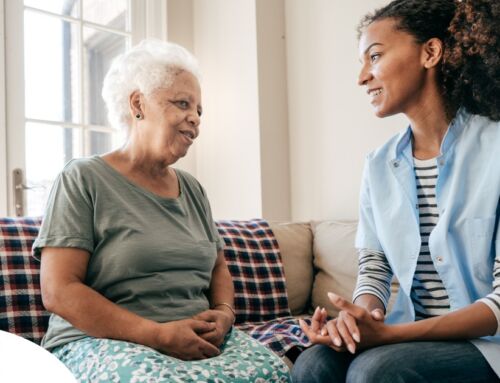Parkinson’s disease (PD) is a degenerative disorder of the central nervous system that can impact a person’s ability to live independently. It was first described in 1817 by James Parkinson, a British physician who published a paper on what he called “the shaking palsy.” In this paper, he set forth the major symptoms of the disease that would later bear his name.
12 Symptoms of Parkinson’s
Early symptoms of Parkinson’s Disease are subtle and occur gradually, which may require assistance for your mom or dad at home as the disease progresses. Affected people may feel mild tremors or have difficulty getting out of a chair. They may notice that they speak too softly or that their handwriting is slow and looks cramped or small. These changes may prompt a search for an aide in your mother or father’s home.
Additionally, they may lose track of a word or thought, or they may feel tired, irritable, or depressed for no apparent reason. This very early period may last a long time before the more classic and obvious symptoms appear, suggesting that services for a home health aide be set up in advance and coordinated by CareGivers of America.
Tremor
The tremor associated with Parkinson’s Disease has a characteristic appearance and can affect daily activities, leading to a search for Alzheimer specific home health aides. Typically, the tremor takes the form of a rhythmic back-and-forth motion at a rate of 4-6 beats per second. It may involve the thumb and forefinger and appear as a “pill rolling” tremor. Tremor often begins in a hand, although sometimes a foot or the jaw is affected first. It is most obvious when the hand is at rest or when a person is under stress.
Rigidity
Rigidity, or a resistance to movement, affects most people with Parkinson’s Disease, resulting in the necessity for a home health aide. A major principle of body movement is that all muscles have an opposing muscle. Movement is possible not just because one muscle becomes more active, but because the opposing muscle relaxes. In Parkinson’s Disease rigidity comes about when, in response to signals from the brain, the delicate balance of opposing muscles is disturbed.
Bradykinesia
Bradykinesia, or the slowing down and loss of spontaneous and automatic movement, and is particularly frustrating because it may make simple tasks somewhat difficult. This may precipitate the need for in-home care services and home healthcare services from CareGivers of America.
Postural instability
Postural instability, or impaired balance, causes patients to fall easily. A number of other symptoms may accompany Parkinson’s Disease; some are minor; others are not. Many can be treated with medication or physical therapy. No one can predict which symptoms will affect an individual patient, and the intensity of the symptoms varies from person to person.
Depression
This is a common problem and may appear early in the course of the disease, even before other symptoms are noticed. Fortunately, depression usually can be successfully treated with antidepressant medications.
Emotional changes
Some people with Parkinson’s Disease become fearful and insecure, leading to the need for long-term care and assistance for elderly at home.
Difficulty swallowing and chewing
Muscles used in swallowing may work less efficiently in later stages of the disease, requiring speech therapy services.
Speech and bladder changes
About half of all Parkinson’s Disease patients have problems with speech, urinary problems, or constipation. In some patients, bladder and bowel problems can occur due to the improper functioning of the autonomic nervous system, which is responsible for regulating smooth muscle activity.
Sleep problems
Sleep problems common in Parkinson’s Disease include difficulty staying asleep at night, restless sleep, nightmares and emotional dreams, and drowsiness or sudden sleep onset during the day. Patients with Parkinson’s Disease should never take over-the-counter sleep aids without consulting their physicians.
Dementia or other cognitive problems
Some, but not all, people with Parkinson’s Disease may develop memory problems and slow thinking, leading to a need for dementia care or Alzheimer care. In some of these cases, cognitive problems become more severe, leading to a condition called Parkinson’s dementia late in the course of the disease. This dementia may affect memory, social judgment, language, reasoning, or other mental skills.
Orthostatic hypotension
Orthostatic hypotension is a sudden drop in blood pressure when a person stands up from a lying-down position. This may cause dizziness, lightheadedness, and, in extreme cases, loss of balance or fainting.
Muscle cramps and dystonia
The rigidity and lack of normal movement associated with Parkinson’s Disease often cause muscle cramps, especially in the legs and toes. Massage, stretching, and applying heat may help with these cramps.
Management
While Parkinson’s Disease usually progresses slowly, eventually the most basic daily routines may be affected — from socializing with friends and enjoying normal relationships with family members to earning a living and taking care of a home. These changes can be difficult to accept, making in-home care services and home healthcare services like those coordinated by CareGivers of America essential.
Support groups can help people cope with the disease emotionally. These groups can also provide valuable information, advice, and experience to help people with Parkinson’s Disease, their families, and their caregivers deal with a wide range of issues, including locating doctors familiar with the disease and coping with physical limitations. A list of national organizations that can help patients locate support groups in their communities appears at the end of this brochure. Individual or family counseling also may help people find ways to cope with Parkinson’s Disease.
People with Parkinson’s Disease also can benefit from being proactive and finding out as much as possible about the disease in order to alleviate fear of the unknown and to take a positive role in maintaining their health. Many people with Parkinson’s Disease continue to work either full- or part-time, although eventually they may need to adjust their schedule and working environment to cope with the disease and explore options for long-term care assistance via a home health aide.
Wrap Up
CareGivers of America works with many families affected by Parkinson’s Disease. We recommend family members learn about the disease, join a Parkinson’s Organization to stay abreast of all new developments in treatment, and be part of the national or local community. There is a lot of support out there to be made use of, including dementia care homes, dementia assisted living, and Alzheimer care options for those facing cognitive challenges as well.
~ ~ ~
For over 30 years, CareGivers of America has proven our leadership in the home health care industry while showing continuous dedication in referring the highest level of care. There is an alternative to nursing homes and assisted living facilities; Home Health Care. We serve families in the south Florida counties of Palm Beach, Broward, and Miami-Dade.
Do you have questions about how you can better support your loved one while they age in place in south Florida or regarding homecare in general? Please contact us here: Click here to contact us or call us toll free: 800-342-4197
Our amazing mailing list is where you’ll receive special content, click here to subscribe.
*No information in this article is to be taken as advice, medical or otherwise. This post is not sponsored, but may contain external links to websites, articles or product examples. External links are used for example or reference purposes only and these links do not indicate specific product or website endorsement by CareGivers of America.





